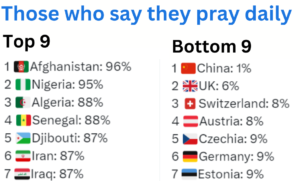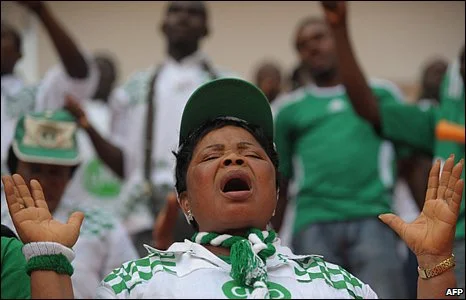A recent survey has shed light on the significant role of prayer in the lives of Nigerians and its potential implications for the country’s social, economic, and political landscape. Nigeria, often referred to as the “Giant of Africa,” is known for its deeply religious population. However, the question that arises is whether Nigeria’s fervent prayer culture is impacting its overall development and progress.
The survey found that a staggering 95% of Nigerians claim to pray daily, ranking the country as the second-highest praying nation globally. Additionally, 89% of adults in Nigeria reported attending religious services weekly, marking the highest percentage in the world. This data highlights the significant role that religion and prayer play in the daily lives of Nigerians.
While prayer can be a source of solace and hope, there is growing concern that an excessive reliance on prayer may hinder Nigeria’s ability to address pressing challenges. The country is currently ranked as the eighth most terrorized nation in the world, facing ongoing security threats and violence. Despite the high prevalence of prayer, Nigeria continues to grapple with issues such as terrorism, bad governance, and environmental crises.
Prayer as a Solution:

The survey indicates that many Nigerians turn to prayer as a means of seeking solutions to financial problems, addressing leadership issues, and dealing with environmental concerns. It has become increasingly common for individuals to spend extensive hours in religious services, seeking divine intervention and miraculous solutions to their problems. Consequently, pastoring and religious ministry have become some of the most lucrative and accessible businesses in the country.
This intense focus on religious activities has led to a proliferation of prayer houses and worship centers, often outnumbering hospitals and schools in some regions. In a concerning trend, many Nigerians are turning to prayer houses for medical and business solutions rather than seeking help from healthcare professionals and experts.
Political and Social Impact:

The impact of prayer culture extends to the political arena as well. Nigeria’s political leaders often call on citizens to pray for divine intervention rather than taking concrete actions to address national issues. Similarly, churches and religious leaders pray for better political leadership, sometimes replacing active participation in the electoral process.
During the COVID-19 pandemic, a significant portion of the Nigerian population turned to prayer for health and prevention measures, often prioritizing religious solutions over science-based ones, such as vaccination.
Believers and JAPA

Interestingly, while Nigeria remains a nation of fervent prayers, an increasing number of its citizens are choosing to immigrate to countries with lower prayer rates. The United Kingdom (6% pray daily), Canada (25%), the United States (55%), and Australia (18%) are among the preferred destinations for Nigerians looking to pursue opportunities abroad.
The survey results raise important questions about the impact of prayer on Nigeria’s progress, development, and problem-solving strategies. While prayer can provide comfort and hope, it is crucial to strike a balance between faith and practical actions to address the country’s multifaceted challenges. As Nigeria navigates its future, the role of religion and prayer in shaping its destiny remains a topic of critical importance.











